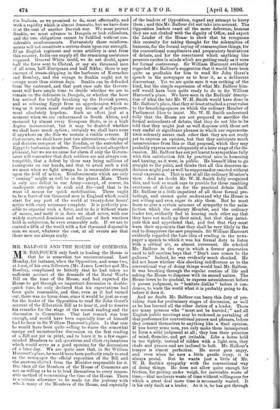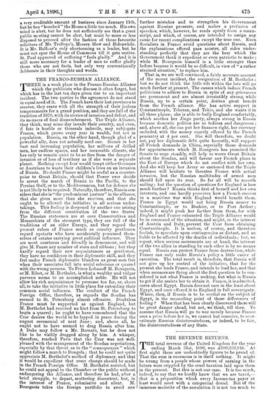MR. BALFOUR AND THE HOUSE OF COMMONS.
MR. BALFOUR'S only fault in leading the House is that he is somewhat too unconventional. Last Monday, for instance, when the Opposition, and some two, at least, of his own followers (Mr. James Lowther and Mr. Bowles), complained so bitterly that he had taken no sufficient account of the demands of the Naval Works Bill on the time of the House, and had expected the House to get through an important discussion in double- quick time, ho only declared that his expectations had been quite reasonable, and that, even as it had turned out, there was no harm done, since it would be just as easy for the leader of the Opposition to read Sir John Gorst's .account of the Education Bill as to hear it, and to reserve his remarks for the stage of the second reading and the discussion in Committee. That last remark was true -enough, and would have been especially true of himself had he been in Sir William Harcourt's place. In that case he would have been quite willing to waive the somewhat unripe and uninstructive discussion on the first reading of a Bill not yet in print, and to leave it to a. few eager- minded Members to ask questions and elicit explanations which would serve as a good opening for the discussions of a later day. We are quite sure that, in Sir William Harcourt's place, he would have been perfectly ready to read in the newspaper the official exposition of the Bill and the answers elicited from the Minister responsible for it. But then all the Members of the House of Commons are not as willing as he is to lend themselves to every reason- able method of economising the time of the House. There is a certain allowance to be made for the jealousy with which many of the Members of the House, and especially of the leaders of Opposition, regard any attempt to hurry them ; and this Mr. Balfour did not take into account. The Opposition leaders exact all the more deference, because they are not clothed with the dignity of Office, and expect the Leader of the House to show that he recognises this necessity for taking thought for the solemnities of business, for the formal saying of commonplace things, for the conventional compliments and preparatory hesitations of debate, and for the resentment which anything like pressure excites in minds which are getting ready as it were for formal controversy. Sir William Harcourt evidently regarded Mr. Balfour's suggestion that it would have been quite as profitable for him to read Sir John Gorst's speech in the newspaper as to hear it, as a deliberate discourtesy. Yet we are quite sure it was nothing of the kind, but the simple expression of what Mr. Balfour him- self would have been quite ready to do in Sir William Harcourt's place. We have seen in the Radicals' descrip- tion of what the late Mr. W. H. Smith would have done in Mr. Balfour's place, that they at least attached a great value to the breathing-spaces on which the ordinary Member of Parliament likes to insist. Mr. W. H. Smith understood fully that the House are not prepared to sacrifice the formal antecedents of debate, that they do not like to be told that they might just as well dispense with those not very useful or significant phrases in which our represents tires solemnly assure each other that they are not ready yet to express an opinion, but that they anticipate much inconvenience from this or that proposal, which they may probably express more adequately at a later stage of the dis- cussion. Mr. Balfour has not yet learnt to sympathise fully with this satisfaction felt by practical men in humming and hawing, as it were, in public. He himself likes to go straight to the point, and thinks that all this decorous in- decision might just as well be suppressed or enacted without vocal expression. That is not at all the ordinary Member's view. And no doubt Mr. W. H. Smith fully recognised this, and took as much care to provide for these rambling overtures of debate as for the practical debate itself. Mr. Balfour is a little impatient of all these formal pre- ludings, and cannot quite understand why the House is not willing and even eager to skip them. But he must learn to give a certain measure of sympathy to the satis- faction which the ordinary Member, and the ordinary leader too, evidently feel in hearing each other say that they have not made up their mind, but that they antici- pate this and apprehend that, and feel that they must warn their opponents that they shall be very likely in the end to disapprove the new proposals. Sir William Harcourt evidently regarded the bare idea of reading in the news- paper a speech to which it was his formal duty to listen with a critical air, as almost irreverent. He rebuked Mr. Balfour in the way in which a former generation used to tell careless boys that " Don't care comes to the gallows." Indeed, he was evidently much shocked. He did not know whither this shocking indifference as to the conventional way of -doing things would lead Mr. Balfour. It was breaking through the regular routine of life and asking the House to dispense with its second nature. The House loves to be gradual, to express astonishment before it passes judgment, to " hesitate dislike " before it con- demns, to warn the world what it is probably going to do, before it does it.
And no doubt Mr. Balfour can learn this duty of pro- viding time for preliminary stages of discussion, as well as he has learned all the other duties of a leader. There are many persons who " must not be hurried ; " and all English public meetings may-be reckoned as partaking of that preference for conventional pauses and phrases, before they commit themselves to anything like a final opinion. If you hurry some men, you only make them incompetent to form a solid judgment at all ; they lose their presence of mind, flounder, and get irritable. Like a horse held in too tightly, instead of ridden with a light rein, they chafe and prance and are inclined to bolt. Mr. Balfour's temper is almost perfection. He never gets angry, and even when he uses a little gentle irony, it is always genial. But he wants just a little of Mr. W. H. Smith's sympathy with the conventional way of doing things. He does not allow quite enough for friction, for getting under weigh, for inevitable waste of time,—that moderate waste of time without willingness for which a great deal more time is necessarily wasted. It is his only fault as a leader. As it is, he has got through a very creditable amount of business since January lltb, but be has "hooshed" the House a little too much. His own mind is alert, but he does not sufficiently see that a great public mceting cannot be alert, but must be more or less disposed to proceed after the fashion of those favourite solicitors of Mr. Trollope's, Messrs. Slow and Bideawhile. It is Mr. Balfour's only shortcoming as a leader, but he must not spur the House of Commons till it gets restive. St. Paul approved of suffering "fools gladly." And it is still more necessary for a leader of men to suffer gladly those who are not fools, but only very conventionally deliberate in their thoughts and words.



































 Previous page
Previous page